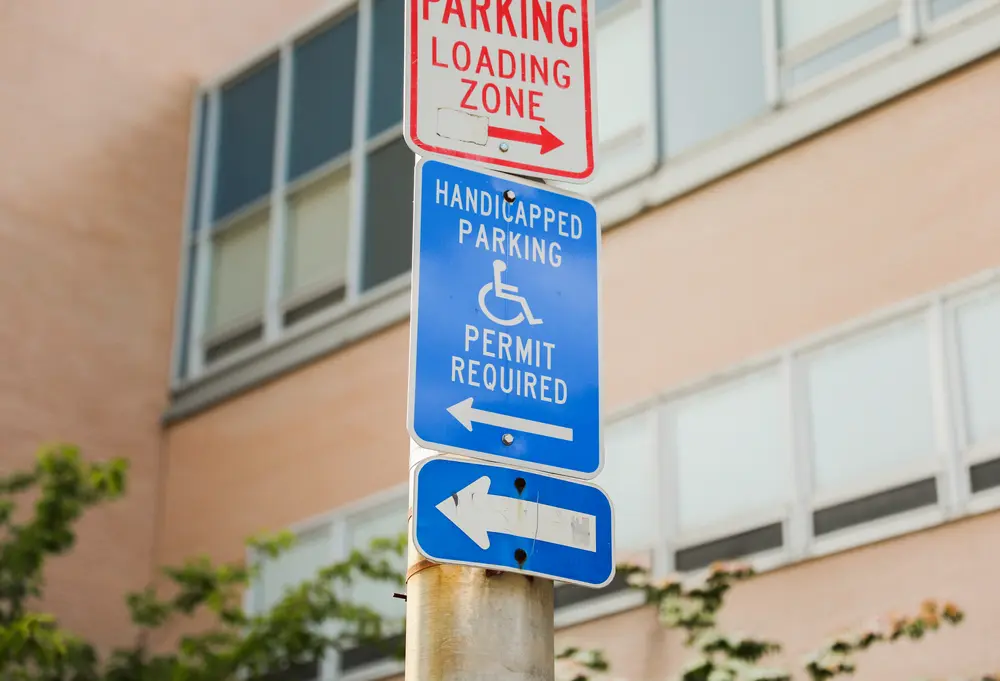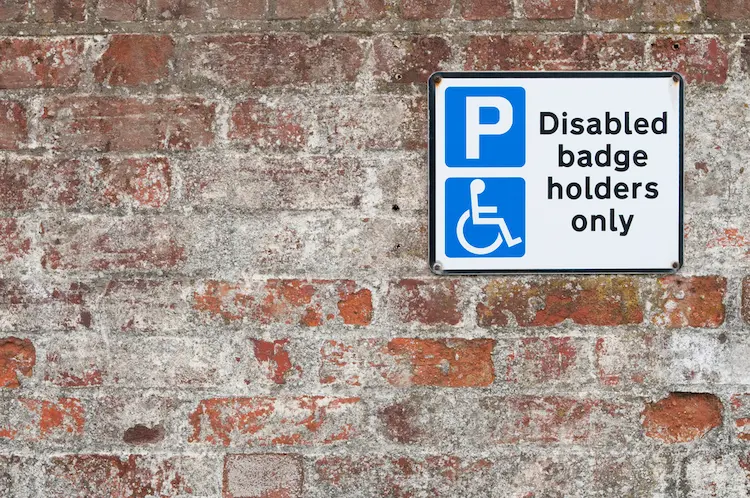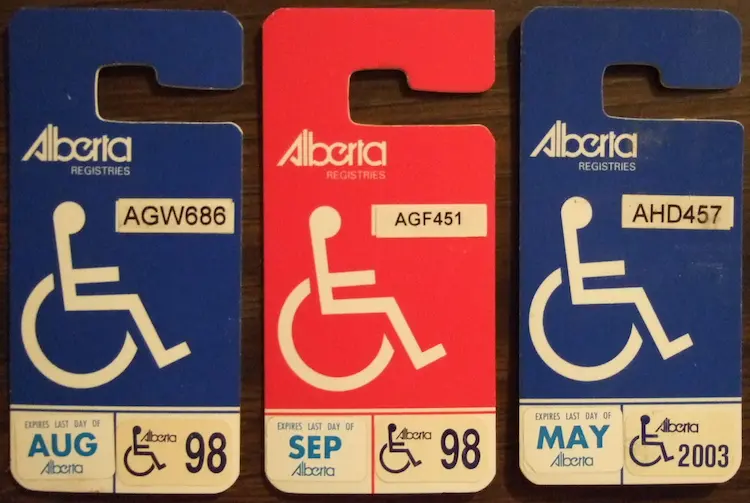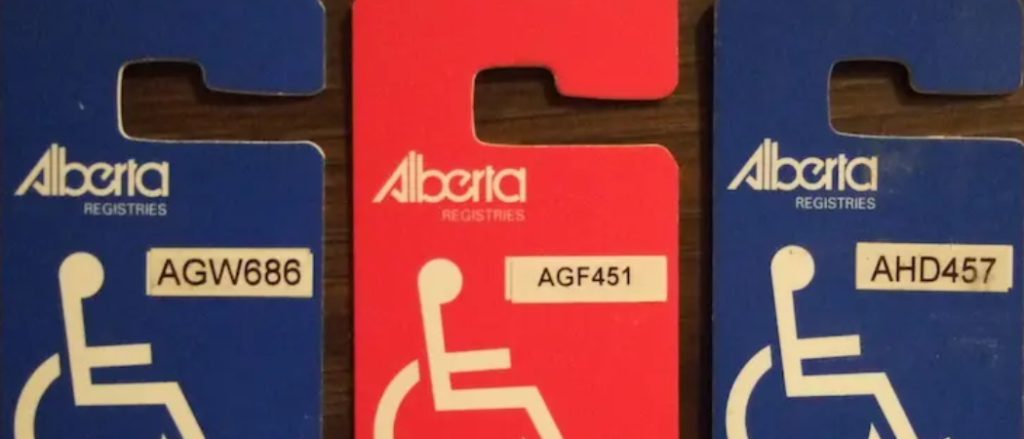In today’s society, inclusivity and accessibility are fundamental principles that apply to public and private spaces.
And having an exclusive accessible parking spot for disabled people is one of them.
You might have seen a blue sign with accessibility in public places such as rehabilitation facilities and hospitals, but did you know they can also be found on private properties?
In our article, we’ll cover all you need to know to provide accessible parking on private property for people with disabilities so you can make good choices and promote diversity.

What is a Handicap Parking Space?
Any parking spot set aside for the exclusive use of people with disabilities, whether on public or private land, is considered a handicapped parking place.
These parking spaces are easily identified since they are designated with the widely known blue and white accessibility international symbol and are usually set near the accessible entrance.
The Americans with Disabilities Act (ADA) establishes some requirements for accessible parking lots.

Parking Spaces in Public Property
Accessible parking is legally necessary on public property, such as government buildings, parks, and public amenities.
Most states mandate the availability of at least some accessible parking spaces and ensure that there must be accessible parking spaces in a parking lot with a larger parking capacity, in which one of every six accessible parking spaces must be van-accessible spaces.
And if there are four or fewer parking spaces, one spot must be provided for a van-accessible space.
A handicapped parking place must also meet minimum requirements of 96 inches wide and 60 inches in the adjacent access aisle.

A small video showing the ADA requirements for parking.
All such and other details have already been discussed in our guide to accessible parking spaces, its rules, and other parking regulations. Click to read.
What If the Public Property Does not Provide an accessible parking Place?
Suppose a business or public institution provides public access but does not have disabled parking.
In that case, the local police department can enforce local laws safeguarding the rights of disabled individuals, such as the right to install handicapped parking places in those areas.
Parking Spaces in Private Property
Regarding accessible parking on private premises, there are a few exceptions to the rules. Such as,
It is not required by law on private property or in residential neighborhoods to have designated handicapped parking spaces.
However, if a private property, whether a private business, a public space, or a store, is available to the general public, they must provide at least one parking space designated for disabled persons.
Categories Of Private Properties
The ADA lists 12 categories of businesses providing goods or services to the public that must comply with the “Safe Harbor” law.
These privately owned public accommodations include stores and shopping centers, restaurants, bars, service establishments, theaters, hotels, recreational facilities, private museums and schools, doctors and dentists’ offices, and other medical facilities and shopping malls, among other businesses.
The ADA’s handicap parking regulations apply to all facilities, including those that do not deal directly with the public (such as office buildings, factories, and warehouses).
Many companies and big parking lot owners in most states are encouraged to designate a specific number of parking spots as “Handicapped parking spaces,” per the Disability Act rules.
Likewise, in public spaces, private parking also requires signage and the international symbol of accessibility and its placement.
Private property owners also have more freedom in designing accessible parking spaces but are encouraged to adhere to ADA standards for consistency and usability.
Depending on the size of the facility, the number of accessible parking spaces on private property may vary in a parking lot.
What If the Private Property owners Do not Provide an accessible parking Place?
In the United States, it is a violation of federal law to fail to offer handicapped parking spots in line with the Americans with Disabilities Act (ADA).
Businesses that don’t follow the law may face punishment from the U.S. Department of Justice.
Learn more about reporting illegal handicapped parking here.

Specific Laws for Using Handicap Parking Permits
Disabled parking spaces are reserved for those who display a valid state-issued accessible parking placard, permit, or license plate.
A disability placard does not entitle handicap permit owners to park just anywhere. The holder of a disability placard is permitted to park in accessible spaces throughout the United States.
There are definite rules regarding disabled parking permits, such as that holders of handicap parking permits are allowed to park in the following areas:
- In the blue zones or designated accessible parking spaces (typically indicated with a wheelchair icon).
- In green zones (typically indicated by specific speed limits).
- In parking lots with meters (in some areas, drivers can park for free and without time limits if they have a handicap placard).
- In residential permit parking areas (even without a permit).
- In parking spaces with time limits (and sometimes without the requirement to adhere to the limits)
But even if one owns a parking permit, there are still certain places that restrict parking, such as,
- No stop or No parking zones
- In cargo zones restricted to commercial vehicles (typically denoted in white),
- In red zones and curbs.
- During the hours that street cleansing occurs.
- During commuter tow times
There are some other rules to be followed, such as always plainly displaying the placard in an accessible parking space, removing the placard from the rearview mirror when your vehicle is in motion, and never lending the placard to family members.
Remember, per your state’s rules, disabled parking permits must be renewed every few years to be valid.
Parking In a Private Parking Lot With A Disability Placard
Disabled drivers with parking permits may use designated parking spaces on private property. Such as,
If a permit holder resides in the building or is visiting a resident of the building, they may park in the parking lots in private residential parking garages.
For private businesses, disabled parking spots may be reserved for those who own the property or its employees. Permit holders who are not affiliated with the business are prohibited from parking in the private disabled spaces.
Ensuring Compliance with Handicap Parking Laws
To check compliance with disability parking regulations, call the local police department and inquire about the legality of requiring handicapped parking on private property. It might lead to information on local parking enforcement.
If you feel an accessible parking area should be enforced, you can request an inquiry to ensure that disability rules are followed. The police may also advise whether disabled parking is required, keeping you compliant with the law and avoiding penalties.
Conclusion
In conclusion, federal law mandates that public property must provide accessible parking, with specific rules and penalties for noncompliance. However, in private parking spaces for the disabled, there are no fixed rules for residential parking, but specific guidelines apply to private companies and businesses.

